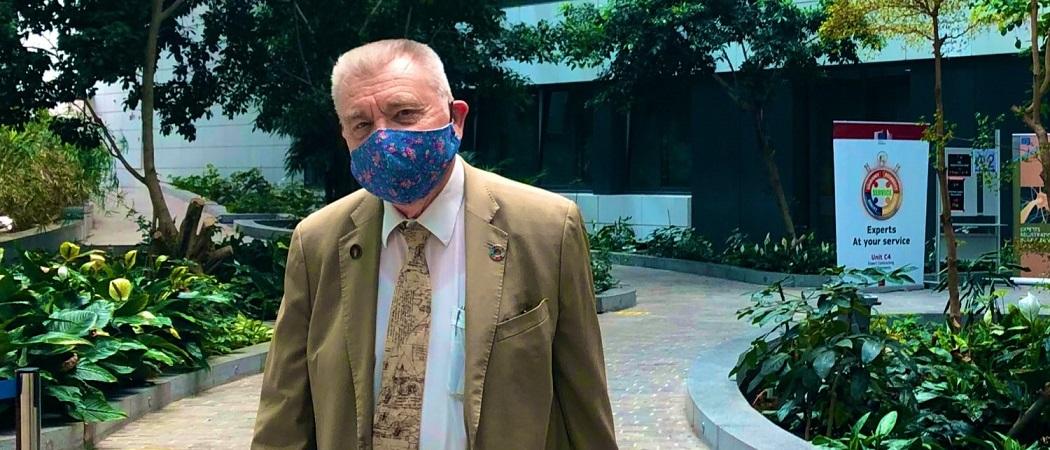The former president thought he was riding into the sunset. But now he’s back to steady the ship during a turbulent period. ‘Serious work is what’s needed’, he says

Professor Jean-Pierre Bourguignon, reappointed as President of the European Research Council (ERC). Photo: ERC Twitter account.
Jean-Pierre Bourguignon is parachuting back in as president of the European Research Council (ERC), on an urgent mission to pull the agency through a looming budget crisis and draw a line under a rocky period.
The French mathematician, who stepped down from the top job last year, officially returns next week to the EU’s main basic research agency and will stay until a new, permanent chief is found.
“When I left, I thought I left. I was on my way to doing other things, but none so extraordinary that I couldn’t stop them,” Bourguignon told Science|Business. “I have a personal connection to the ERC. It has allowed me to meet fantastic people.”
Bourguignon was ERC president from January 2014 until December 2019. His successor was nanobiologist Mauro Ferrari, whose tenure lasted for three months before a very noisy departure.
The sense around the ERC in recent months was of a ship beginning to drift without a captain. Only yesterday, the former EU director general for research and innovation, Robert-Jan Smits, criticised the agency for a lack of “strategic leadership”.
It has been a hard, unpredictable year for the agency, which had to face down criticism from Ferrari for its handling of the COVID-19 crisis, but also, in the past week, from advocates of open access to scientific research papers, who were dismayed at the agency for pulling its support for an open access initiative.
In its statement announcing his unexpected sequel, ERC says, “Bourguignon’s reappointment comes at a crucial moment when strong leadership is needed for the organisation.”
A funding emergency also looms. “My priority is to jump straight into the budget debate. Serious work is what’s needed,” said Bourguignon.
“Shocked” is how he describes his reaction to the huge research cut by member state leaders at the big EU summit this week. On Tuesday, governments agreed on a pared-back budget of €80.9 billion for the Horizon Europe research programme, due to start next year. The final figure was significantly lower than a proposal of €94.4 billion put forward by the European Commission in May.
“I was very surprised that Horizon Europe was one of the main targets,” Bourguignon said.
When he took on the helm of the agency in 2014, ERC had just seen a 60 per cent increase in funding, to €13 billion. The agency was expecting a similar upward trajectory in funding under Horizon Europe. That is now in doubt.
Bourguignon said he has already been on the phone to members of the European Parliament, drumming up support for a bigger research budget. In their debate on Thursday on the agreement struck by EU leaders, many members of the EU assembly said they would fight to reverse cuts.
“The timing is extremely short. Everything has to happen in September and October; everything has to be completely finished if the programme (Horizon Europe) is going to start on schedule,” Bourguignon said.
If the EU doesn’t manage to “show its commitment on research, I’ll be worried as a European. We need to take on this challenge. Young researchers have to know they’ll get the right support from us,” he said.
Bourguignon remains popular among the ERC rank and file and, judging by the reaction to his return, the scientific faithful at large are relieved to welcome him back. “There’ll be people happy and people unhappy I’m sure,” he said.
EU research commissioner Mariya Gabriel said Bourguignon “has the experience and the trust of the scientific community and I have full confidence that he will provide the leadership necessary to ensure a proper functioning of the European Research Council at a crucial moment of preparations for Horizon Europe.”
Bourguignon expects his new turn as head of ERC will wind up before the end of the year. “The ideal thing is to have someone new who is fully ready to go on January 1, 2021,” he said.
The troublesome question of succession, which seemed settled when ERC picked star scientist Ferrari to head the agency, blew up in spectacular fashion in April, with the Italian-American’s abrupt departure making headlines around the world.
“I am afraid that I have seen enough of both the governance of science, and the political operations at the European Union,” Ferrari said at the time, in criticism of the EU’s slow response to the pandemic.
Ultimately, Ferrari’s criticism of the ERC, and the wider Brussels machine, was premature, suggested Bourguignon.
“I think [the EU] rose to the occasion on COVID-19. It did come up with appropriate tools. All the commissioners worked very, very hard. The ERC was flexible too; some grantees asked for changes in their grants, and these happened,” he said.





 A unique international forum for public research organisations and companies to connect their external engagement with strategic interests around their R&D system.
A unique international forum for public research organisations and companies to connect their external engagement with strategic interests around their R&D system.